小学最全英语语法汇总
小学英语语法知识超全整理
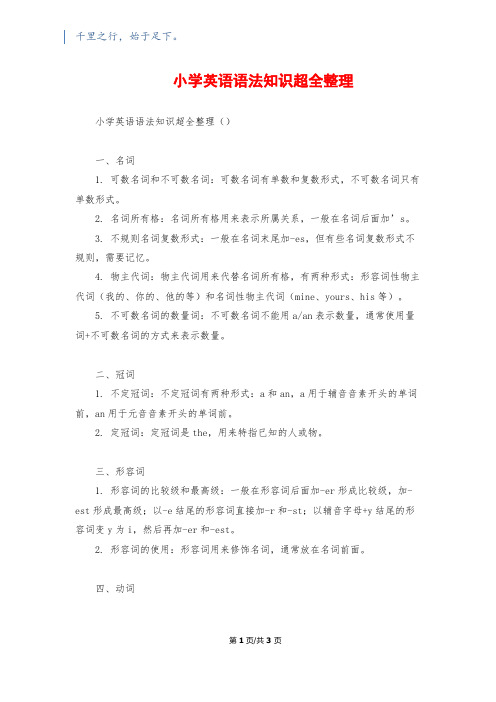
千里之行,始于足下。
小学英语语法知识超全整理小学英语语法知识超全整理()一、名词1. 可数名词和不可数名词:可数名词有单数和复数形式,不可数名词只有单数形式。
2. 名词所有格:名词所有格用来表示所属关系,一般在名词后面加’s。
3. 不规则名词复数形式:一般在名词末尾加-es,但有些名词复数形式不规则,需要记忆。
4. 物主代词:物主代词用来代替名词所有格,有两种形式:形容词性物主代词(我的、你的、他的等)和名词性物主代词(mine、yours、his等)。
5. 不可数名词的数量词:不可数名词不能用a/an表示数量,通常使用量词+不可数名词的方式来表示数量。
二、冠词1. 不定冠词:不定冠词有两种形式:a和an,a用于辅音音素开头的单词前,an用于元音音素开头的单词前。
2. 定冠词:定冠词是the,用来特指已知的人或物。
三、形容词1. 形容词的比较级和最高级:一般在形容词后面加-er形成比较级,加-est形成最高级;以-e结尾的形容词直接加-r和-st;以辅音字母+y结尾的形容词变y为i,然后再加-er和-est。
2. 形容词的使用:形容词用来修饰名词,通常放在名词前面。
四、动词第1页/共3页锲而不舍,金石可镂。
1. 动词的时态:英语中的动词时态包括一般现在时、一般过去时和一般将来时等。
2. 动词的非谓语形式:动词的非谓语形式包括动词不定式(to do)、动名词(doing)和分词(done)等。
五、副词1. 副词的用法:副词用来修饰动词、形容词或其他副词,通常放在被修饰的词之前或之后。
2. 副词的比较级和最高级:一般在副词前面加more或most形成比较级和最高级;以字母e结尾的副词直接加-r和-st;以字母y结尾的副词变y为i,然后再加-er和-est。
六、代词1. 人称代词:人称代词分为主格和宾格两种形式,主格用来作主语,宾格用来作宾语。
2. 反身代词:反身代词用来表示动作反射到自己身上,形式为主格+self (单数)或主格+themselves(复数)。
(完整版)小学英语语法大全

小学英语语法大全一、名词复数规则1.一般情况下,直接加-s,如:book-books, bag-bags, cat-cats, bed-beds2.以s. x. sh. ch结尾,加-es,如:bus-buses, box-boxes, brush-brushes, watch-watches3.以“辅音字母y”结尾,变y为i, 再加-es,如:family-families, strawberry-strawberries4.以“f或fe”结尾,变f或fe为v, 再加-es,如:knife-knives ]Leaf——leaves5.不规则名词复数:man-men, woman-women, policeman-policemen, policewoman-policewomen,child-childrenfoot-feet,.tooth-teethfish-fish, people-people, Chinese-Chinese,Japanese-Japanese写出下列各词的复数I _________him _________this ___________her ______watch _______child _______photo ________diary ______day________ foot________ book_______ dress ________tooth_______ sheep ______box_______ strawberry _____peach______ sandwich ______dish_______bus_______man______ woman_______二、一般现在时一般现在时基本用法介绍【No. 1】一般现在时的功能1.表示事物或人物的特征、状态。
如:The sky is blue.天空是蓝色的。
2.表示经常性或习惯性的动作。
小学英语语法大全打印版
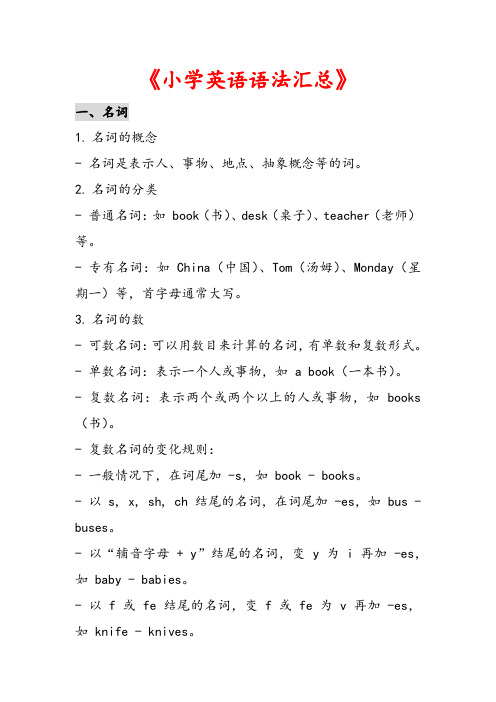
《小学英语语法汇总》一、名词1.名词的概念- 名词是表示人、事物、地点、抽象概念等的词。
2.名词的分类- 普通名词:如 book(书)、desk(桌子)、teacher(老师)等。
- 专有名词:如 China(中国)、Tom(汤姆)、Monday(星期一)等,首字母通常大写。
3.名词的数- 可数名词:可以用数目来计算的名词,有单数和复数形式。
- 单数名词:表示一个人或事物,如 a book(一本书)。
- 复数名词:表示两个或两个以上的人或事物,如 books (书)。
- 复数名词的变化规则:- 一般情况下,在词尾加 -s,如 book - books。
- 以 s, x, sh, ch 结尾的名词,在词尾加 -es,如 bus - buses。
- 以“辅音字母 + y”结尾的名词,变 y 为 i 再加 -es,如 baby - babies。
- 以 f 或 fe 结尾的名词,变 f 或 fe 为 v 再加 -es,如 knife - knives。
- 不可数名词:不能用数目来计算的名词,如 water(水)、milk(牛奶)、rice(米饭)等。
不可数名词没有复数形式。
4.名词的所有格- 表示所属关系,有两种形式:- ’s 所有格:一般用于有生命的名词后,如 Tom’s book (汤姆的书)。
- of 所有格:一般用于无生命的名词后,如 the door of the classroom(教室的门)。
二、代词1.代词的概念- 代词是用来代替名词或名词短语的词。
2.代词的分类- 人称代词:表示“我”“你”“他”“她”“它”“我们”“你们”“他们”等的词。
- 主格:I(我)、you(你;你们)、he(他)、she(她)、it(它)、we(我们)、they(他们),在句子中作主语。
- 宾格:me(我)、you(你;你们)、him(他)、her(她)、it(它)、us(我们)、them(他们),在句子中作宾语。
(完整版)小学最全英语语法汇总
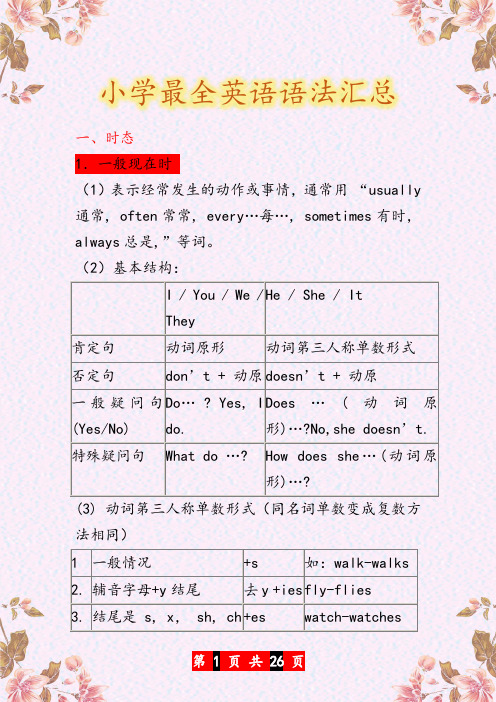
小学最全英语语法汇总一、时态1.一般现在时(1)表示经常发生的动作或事情,通常用“usually 通常, often常常, every…每…, sometimes有时,always总是,”等词。
(2)基本结构:I / You / We /TheyHe / She / It肯定句动词原形动词第三人称单数形式否定句don’t + 动原doesn’t + 动原一般疑问句(Yes/No) Do… ? Yes, Ido.Does…(动词原形)…?No,she doesn’t.特殊疑问句What do …? How does she…(动词原形)…?(3) 动词第三人称单数形式(同名词单数变成复数方法相同)1 一般情况+s 如:walk-walks2. 辅音字母+y结尾去y +ies f ly-flies3. 结尾是 s, x, sh, ch +es watch-watches4.特殊的do-does ,have-has, go-goes2.现在进行时,(1)表示正在发生的动作,通常用“now现在, look 看,linsen听”.(2)基本形式: be + 动词ingeg: I am(not) doing my homework.You/We/They are(not) reading.He/She/It is(not) eating.What are you doing?Is he reading?(3)动词的现在分词形式(动词+ing)一般情况+ing walk—walking结尾是不发音的 e -e +ingcome—coming重读闭音节双写最后一个字母+ing run-running swim-swimming3. 一般过去时(1)表示过去已经发生的事情,通常用“last …上一个…, just now刚才, a moment ago刚才,yesterday 昨天”等词。
(2) be 动词的过去式: am/is —was are —were(3)过去式基本结构 肯定句(Positive )动词过去式 I went shopping lastnight. 否定句(Negative) Didn ’t + 动词原形I didn ’t go shoppinglast night. 一般疑问句(Yes/No) Did …+ 动词原形…? Did you go shopping last night?特殊疑问句(wh-) What did …+ 动词原形…? What did you do last night?(4)词过去式的变化:规则动词的变化:一般动词 +ed planted,watered,climbed以不发音的e 结尾+d liked 辅音字母加y 结尾 -y+ ied study —studied,cry- cried重读闭音节单词,末尾只有一个辅音字母 双写最后一个字母+edstop –stopped plan - planned不规则动词的变化:原形 过去式 原形 过去式 原形 过去式 原形 过去式sweep swept t each taught have had go wentkeep kept think thought do did find foundsleep slept b uy bought eat ate say saidfeelfelt drink drank is/am w as take took readread give gave are were mean meant putput sing sang drive d rove meet met cutcut begin began speak s poke make made letlet ring rang write w rote see saw flyflew run ran ride rode come came drawdrew sit sat hear heard tell told grow grew learn learned/ learntget got know knew 4.一般将来时一般将来时表示将来打算做的事或将要发生的事情。
(完整版)小学英语语法大全(绝对全面),推荐文档

教育精品资料小学英语语法大全第一章一、定义名词是表示人或事物名称的词。
它既可以表示具体的东西,也可以是表示抽象的东西。
二、分类1.名词可以根据意义分为普通名词和专有名词如:john is a studentstudent 是普通名词,john 是专有名词普通名词前可以用不定冠词 a/an, 定冠词 the 或不加冠词,专有名词前一般不加冠词,专有名词的首字母要大写。
2.普通名词又可以分为个体名词、集体名词、物质名词和抽象名词,其中个体名词与集体名词是可数名词,物质名词和抽象名称是不可数名词。
3.专有名词专有名词是表示人名、地名、团体、机构、组织等的专有名词,多为独一无二的事物。
三、名词的数1、名词分为可数名词和不可数名词。
可数名词——可以数的名词不可数名词——数不清(没有复数)drink?milk tea water orange juice cokecoffee porridge food?rice bread meat fishfruit cake dumplings2、可数名词与不定冠词 a(an)连用有数数形式,不可数名词不能与不定冠词 a(an)连用,没有复数形式many+可数名词复数much/a little+不可数名词some, any , a lot of (lots of) 两者都可以修饰。
3、可数名词可以直接用数词来修饰不可数名词数词 +量词 +of + 名词对可数名词的数量提问用 how many 对不可数名词的数量提问用 how much4、不可数名词的量有以下两种表示方法:1)some, much ,a little ,a lot of ,a bit of , plenty of 用等表示多少。
注意既可以与可数名词复数,又可以与不可数名词连用的有:plenty of ,some ,a lot of ,lots of ,most of 等。
如 there is much water in the bottle .瓶中有很多水。
小学英语语法大汇总

小学英语语法大汇总
一、名词
1.可数名词和不可数名词
2.单数名词和复数名词
3.不规则变化的复数名词
二、代词
1.主格代词和宾格代词
2.形容词性物主代词和名词性物主代词
3.反身代词
三、冠词
1. 不定冠词a/an和定冠词the
四、形容词
1.形容词的用法和比较级、最高级的构成方式
五、动词
1.动词的基本形式、过去式和现在分词形式
2.动词的时态:一般现在时、一般过去时、将来时
3.动词的被动语态
六、副词
1.副词的用法和比较级、最高级的构成方式
七、介词
1.常见的介词及其用法
八、连词
1.并列连词和从属连词
九、数词
1.基数词和序数词的用法
十、时间状语
1.表示时间的常用词汇和句型
十一、否定句
1.否定句的构成方式和位置
十二、疑问句
1.一般疑问句的构成方式和回答方式
2.特殊疑问句的构成方式
以上是小学英语语法的大汇总,包括名词、代词、冠词、形容词、动词、副词、介词、连词、数词、时间状语、否定句、疑问句等内容。
掌握这些基本语法知识,能够帮助学生在日常学习和交流中正确使用英语,并提高语言表达的准确性和流畅性。
小学所有英语语法知识点归纳总结

小学所有英语语法知识点归纳总结英语语法是学习英语的基础,掌握好语法知识对于小学生来说非常重要。
下面对小学所有英语语法知识点进行归纳总结,帮助同学们更好地学习和理解。
一、名词(Noun)名词是指人、事物、地点等具体或抽象的实体。
名词的种类分为可数名词和不可数名词。
1. 可数名词(Countable Noun)可数名词是指可以用数字来计数的名词。
可数名词的单数形式和复数形式存在区别,复数形式通常在词尾添加-s或-es。
例:单数:book(书)复数:books(书籍)单数:dog(狗)复数:dogs(狗)2. 不可数名词(Uncountable Noun)不可数名词是指无法进行数学计数的名词,它们表示一种整体或抽象的概念。
不可数名词没有复数形式。
例:milk(牛奶) water(水) music(音乐)二、代词(Pronoun)代词是用来替代名词或名词短语的词语。
根据其使用方式和指代对象,代词分为以下几种类型:1. 人称代词(Personal Pronoun)人称代词用来代替人或事物的特定人称。
主格:I(我) you(你) he(他) she(她) it(它) we(我们)they(他们)宾格:me(我) you(你) him(他) her(她) it(它) us(我们)them(他们)形容词性物主代词:my(我的) your(你的) his(他的) her(她的) its(它的) our(我们的) their(他们的)名词性物主代词:mine(我的) yours(你的) his(他的) hers(她的) its(它的) ours(我们的) theirs(他们的)2. 指示代词(Demonstrative Pronoun)指示代词用来指示特定的人或事物。
this(这) that(那) these(这些) those(那些)3. 不定代词(Indefinite Pronoun)不定代词用来代替不确定或未具体指定的人或事物。
小学英语必背语法汇总
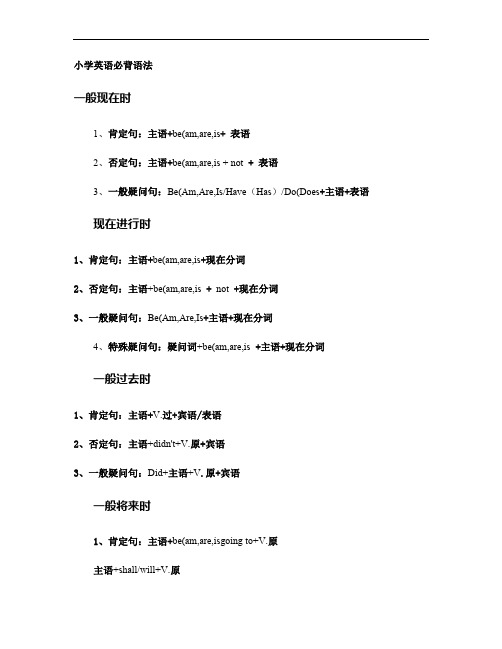
小学英语必背语法一般现在时1、肯定句:主语+be(am,are,is+ 表语2、否定句:主语+be(am,are,is + not + 表语3、一般疑问句:Be(Am,Are,Is/Have(Has)/Do(Does+主语+表语现在进行时1、肯定句:主语+be(am,are,is+现在分词2、否定句:主语+be(am,are,is + not +现在分词3、一般疑问句:Be(Am,Are,Is+主语+现在分词4、特殊疑问句:疑问词+be(am,are,is +主语+现在分词一般过去时1、肯定句:主语+V.过+宾语/表语2、否定句:主语+didn't+V.原+宾语3、一般疑问句:Did+主语+V.原+宾语一般将来时1、肯定句:主语+be(am,are,isgoing to+V.原主语+shall/will+V.原2、否定句:主语+be(am,are,is+not going to+V.原主语+shall/will+V.原3、一般疑问句:Be(Am,Are,Is+主语+going to+V.原Shall/Will+主语+V.原疑问词+shall/will+主语+V.原4、特殊疑问句:疑问词+be(am,are,is +主语+going to+V.原过去进行时1、肯定句:主语+was/were+现在分词2、否定句:主语+was/were+not+现在分词3、一般疑问句:Was/Were+主语+现在分词4、特殊疑问句:疑问词+was/were+主语+现在分词现在完成时1、肯定句:+have/has+V.过去分词2、否定句:主语+have/has+not+V.过去分词3、一般疑问句:Have/Has+主语+V.过去分词4、特殊疑问句:疑问词+have/has+主语+V.过去分词。
小学最全英语语法汇总

小学最全英语语法汇总小学英语语法主要包括句子结构、时态、主谓一致、名词、代词、形容词、副词、介词等内容。
下面是小学英语语法的完整汇总。
1.句子结构-一个基本句子包括主语和谓语。
-主语一般是句子的主要行为的执行者,谓语则表示主语的动作或状态。
-句子中的动词可以是及物动词或不及物动词。
2.时态-现在时态:表示现在正在发生的动作或状态。
-过去时态:表示过去已经发生的动作或状态。
-将来时态:表示将要发生的动作或状态。
-现在进行时:表示现在正在进行的动作或状态。
-过去进行时:表示过去其中一时刻正在进行的动作或状态。
3.主谓一致-当主语是第三人称单数时,谓语动词要用第三人称单数。
-当主语是复数时,谓语动词要用复数形式。
4.名词-名词是指人、物、地点、时间等的名称。
-可数名词可以用单数形式或复数形式。
-不可数名词只能用单数形式,不能用复数。
5.代词-代词是用来代替名词的词汇。
-人称代词包括主格和宾格。
-物主代词表示所属关系。
-指示代词用来指示物体或人。
6.形容词-形容词用来描述名词的性质、状态或特征。
- 形容词可以放在名词之前作定语,也可以放在be动词之后作表语。
7.副词-副词用来修饰动词、形容词或其他副词。
-副词可以表示时间、地点、方式、程度等。
8.介词-介词用来表达名词之间的关系。
- 常用的介词有in、on、at、of、to等。
以上是小学英语语法的主要内容,需要根据年级和学习进度的不同进行具体的学习和掌握。
通过学习英语语法,学生可以更好地理解和运用英语,提高听、说、读、写的能力。
新版小学英语语法大全【完整版】.pdf
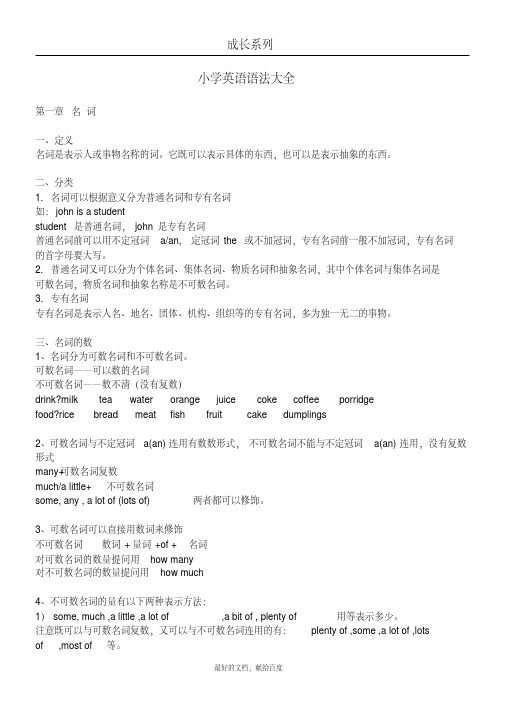
小学英语语法大全第一章名词一、定义名词是表示人或事物名称的词。
它既可以表示具体的东西,也可以是表示抽象的东西。
二、分类1. 名词可以根据意义分为普通名词和专有名词如:john is a studentstudent是普通名词,john是专有名词普通名词前可以用不定冠词a/an, 定冠词the 或不加冠词,专有名词前一般不加冠词,专有名词的首字母要大写。
2. 普通名词又可以分为个体名词、集体名词、物质名词和抽象名词,其中个体名词与集体名词是可数名词,物质名词和抽象名称是不可数名词。
3. 专有名词专有名词是表示人名、地名、团体、机构、组织等的专有名词,多为独一无二的事物。
三、名词的数1、名词分为可数名词和不可数名词。
可数名词——可以数的名词不可数名词——数不清(没有复数)drink?milk tea water orange juice coke coffee porridgefood?rice bread meat fish fruit cake dumplings2、可数名词与不定冠词a(an)连用有数数形式,不可数名词不能与不定冠词a(an)连用,没有复数形式many+可数名词复数much/a little+不可数名词some, any , a lot of (lots of) 两者都可以修饰。
3、可数名词可以直接用数词来修饰不可数名词数词 +量词 +of + 名词对可数名词的数量提问用how many对不可数名词的数量提问用 how much4、不可数名词的量有以下两种表示方法:1) some, much ,a little ,a lot of ,a bit of , plenty of 用等表示多少。
注意既可以与可数名词复数,又可以与不可数名词连用的有:plenty of ,some ,a lot of ,lotsof ,most of 等。
如there is much water in the bottle .瓶中有很多水。
(完整版)小学英语语法总结全集
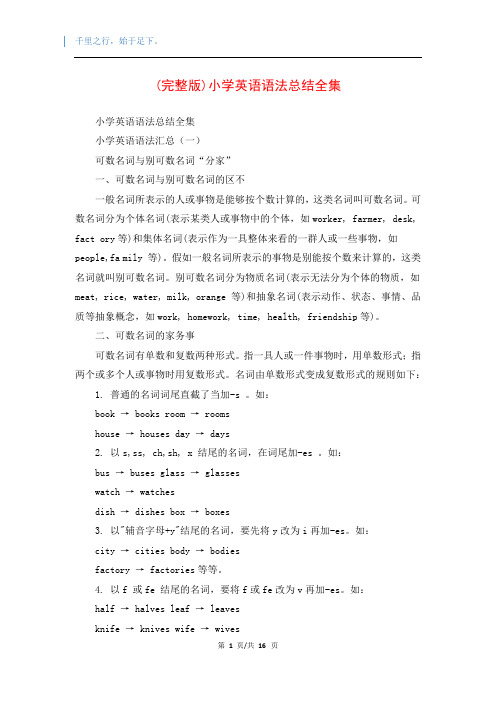
(完整版)小学英语语法总结全集小学英语语法总结全集小学英语语法汇总(一)可数名词与别可数名词“分家”一、可数名词与别可数名词的区不一般名词所表示的人或事物是能够按个数计算的,这类名词叫可数名词。
可数名词分为个体名词(表示某类人或事物中的个体,如worker, farmer, desk, fact ory等)和集体名词(表示作为一具整体来看的一群人或一些事物,如people,fa mily 等)。
假如一般名词所表示的事物是别能按个数来计算的,这类名词就叫别可数名词。
别可数名词分为物质名词(表示无法分为个体的物质,如meat, rice, water, milk, orange 等)和抽象名词(表示动作、状态、事情、品质等抽象概念,如work, homework, time, health, friendship等)。
二、可数名词的家务事可数名词有单数和复数两种形式。
指一具人或一件事物时,用单数形式;指两个或多个人或事物时用复数形式。
名词由单数形式变成复数形式的规则如下: 1. 普通的名词词尾直截了当加-s 。
如:book → books room → roomshouse → houses day → days2. 以s,ss, ch,sh, x 结尾的名词,在词尾加-es 。
如:bus → buses glass → glasseswatch → watchesdish → dishes box → boxes3. 以"辅音字母+y"结尾的名词,要先将y改为i再加-es。
如:city → cities body → bodiesfactory → factories等等。
4. 以f 或fe 结尾的名词,要将f或fe改为v再加-es。
如:half → halves leaf → leavesknife → knives wife → wives5. 特例[悄悄话:特例常常考,要记住。
小学英语语法知识超全整理
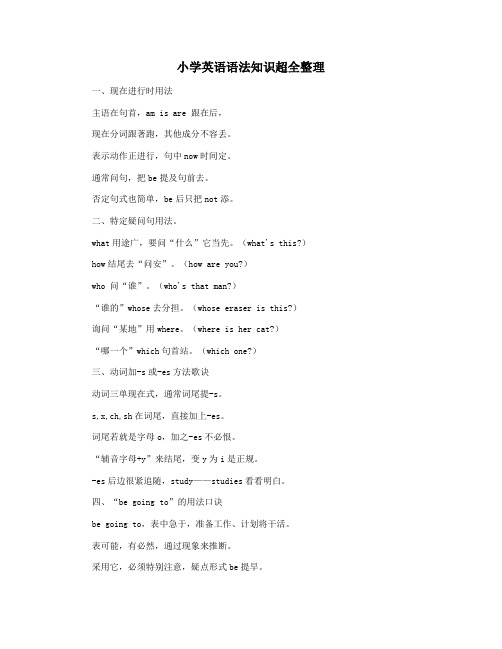
小学英语语法知识超全整理一、现在进行时用法主语在句首,am is are 跟在后,现在分词跟著跑,其他成分不容丢。
表示动作正进行,句中now时间定。
通常问句,把be提及句前去。
否定句式也简单,be后只把not添。
二、特定疑问句用法。
what用途广,要问“什么”它当先。
(what's this?)how结尾去“问安”。
(how are you?)who 问“谁”。
(who's that man?)“谁的”whose去分担。
(whose eraser is this?)询问“某地”用where。
(where is her cat?)“哪一个”which句首站。
(which one?)三、动词加-s或-es方法歌诀动词三单现在式,通常词尾提-s。
s,x,ch,sh在词尾,直接加上-es。
词尾若就是字母o,加之-es不必恨。
“辅音字母+y”来结尾,变y为i是正规。
-es后边很紧追随,study——studies看看明白。
四、“be going to”的用法口诀be going to,表中急于,准备工作、计划将干活。
表可能,有必然,通过现象来推断。
采用它,必须特别注意,疑点形式be提早。
否定句,更简单,not放在be后边。
to之后,颤抖原型,be的形式看看人称。
下列词,要注意,come go 和离去(leave)展开时,表中将来,牢牢忘记莫忘掉。
一、形容词性物主代词。
1、形容词性物主代词8个:my、your、his、her、its、our、your、their我的、你的、他的、她的、它的、我们的、你们的、它(他、她)们的2、形容词性物主代词的特点:①翻译成汉语都存有“的”eg:my 我的 their 他们的②后面加名词:eg:my backpack his name③前后不必冠词 a an thethis is a my eraser(错误)that is your a pen(错误)it's his the pen(错误)3、i(物主代词)my you(物主代词)your he(物主代词)her we(物主代词)our注:在变物主代词时,把原题所给的词加上的,再译成单词就可以了。
(完整版)小学英语语法大全-附练习题,推荐文档
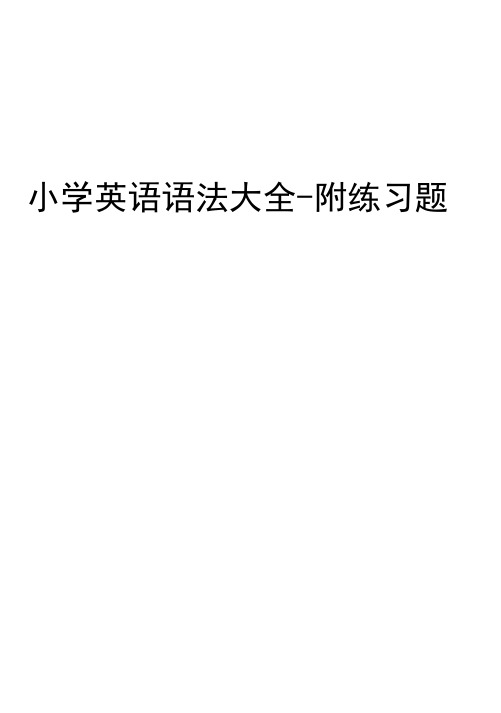
小学英语语法大全-附练习题Contents第一章名词1.名词的数2.名词的格第二章代词1.人称代词2.物主代词第三章冠词与数词1.冠词2.数词第四章一般现在时态第五章现在进行时态第六章句型1.陈述句2.疑问句3.祈使句4.There be 句型与have\ has第七章总结考试第一章名词 (Noun )名词的概念在生活中,我们会接触到各种各样的人和事物,用来表示这些人或事物名称的词就是名词。
一、名词的数名词的数指名词的单数和复数形式。
可数名词表示“一个”时用单数, “两个以上”时用复数;不可数名词表示量时, 通常用“数词+单位+of+物质名词”的形式,如a piece of bread (一片面包),变monkey --- monkeys 5.以 3'结尾的名词,复数一般在词尾加“ s”,但个别加es”tomato --- tomatoes (西红柿) 词尾读音[z ]potato --- potatoes (土豆) zoo --- zoos (动物园) photo --- photos (照片)* (以 o"结尾,复数加 es”)口诀:黑人(Negro )英雄(hero ),左手拿着西红柿(tomato ),右手拿着破土豆(potato ), 头顶一个大芒果(mango )。
6.以f 或fe 结尾的词,多数变 leaf --- leaves (树叶) knife --- knives ( 小刀)*(以f 或fe 结尾的单词,需把 妻子(wife )持刀(knife )去宰 半(half )片树叶(leaf )遮目光。
*(以f 或fe 结尾的单词,直接加 s”的单词)口诀:长颈鹿(giraffe )站在屋檐(roof )下,左手拿着手绢(handkerchief ),右手拿着高尔夫球(golf )。
例:roof --- roofs (屋顶)7 .不规则名词复数的变化为复数时,只须将单位名词变为复数, *名词复数的构成法则1 . 一般情况下在词尾加 s. shop --- shops (商店) bag --- bags (书包) window --- windows ( 窗户)2 .以s, x, sh, ch 结尾的单词在词尾加 class --- classes 班级)box --- boxes (盒子) match --- matches(比赛) brush --- brushes (刷子)3 .以“辅音字母 +y”结尾的词, story --- stories (故事)4 .以“元音字母 +y” key --- keys如:two pieces of bread (两片面包)。
(完整版)小学英语语法大全【完整版】
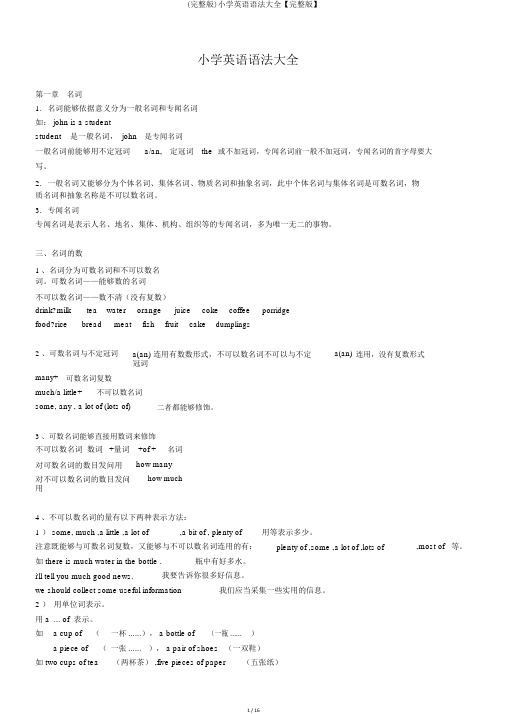
小学英语语法大全第一章名词1.名词能够依据意义分为一般名词和专闻名词如: john is a studentstudent 是一般名词, john是专闻名词一般名词前能够用不定冠词a/an,定冠词the或不加冠词,专闻名词前一般不加冠词,专闻名词的首字母要大写。
2.一般名词又能够分为个体名词、集体名词、物质名词和抽象名词,此中个体名词与集体名词是可数名词,物质名词和抽象名称是不可以数名词。
3.专闻名词专闻名词是表示人名、地名、集体、机构、组织等的专闻名词,多为唯一无二的事物。
三、名词的数1、名词分为可数名词和不可以数名词。
可数名词——能够数的名词不可以数名词——数不清(没有复数)drink?milk tea water orange juice coke coffee porridgefood?rice bread meat fish fruit cake dumplings2 、可数名词与不定冠词a(an) 连用有数数形式,不可以数名词不可以与不定冠词a(an) 连用,没有复数形式many+ 可数名词复数much/a little+ 不可以数名词some, any , a lot of (lots of) 二者都能够修饰。
3、可数名词能够直接用数词来修饰不可以数名词数词+量词对可数名词的数目发问用对不可以数名词的数目发问用+of +名词how manyhow much4、不可以数名词的量有以下两种表示方法:1 ) some, much ,a little ,a lot of ,a bit of , plenty of 用等表示多少。
注意既能够与可数名词复数,又能够与不可以数名词连用的有:plenty of ,some ,a lot of ,lots of ,most of 等。
如 there is much water in the bottle . 瓶中有好多水。
i'll tell you much good news. 我要告诉你很多好信息。
小学英语语法大全(完整版)(可打印)
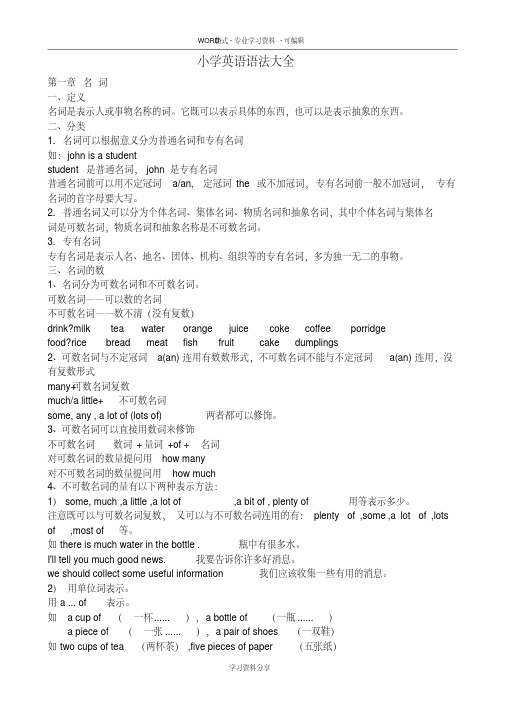
小学英语语法大全第一章名词一、定义名词是表示人或事物名称的词。
它既可以表示具体的东西,也可以是表示抽象的东西。
二、分类1. 名词可以根据意义分为普通名词和专有名词如:john is a studentstudent是普通名词,john是专有名词普通名词前可以用不定冠词a/an, 定冠词the 或不加冠词,专有名词前一般不加冠词,专有名词的首字母要大写。
2. 普通名词又可以分为个体名词、集体名词、物质名词和抽象名词,其中个体名词与集体名词是可数名词,物质名词和抽象名称是不可数名词。
3. 专有名词专有名词是表示人名、地名、团体、机构、组织等的专有名词,多为独一无二的事物。
三、名词的数1、名词分为可数名词和不可数名词。
可数名词——可以数的名词不可数名词——数不清(没有复数)drink?milk tea water orange juice coke coffee porridgefood?rice bread meat fish fruit cake dumplings2、可数名词与不定冠词a(an)连用有数数形式,不可数名词不能与不定冠词a(an)连用,没有复数形式many+可数名词复数much/a little+不可数名词some, any , a lot of (lots of) 两者都可以修饰。
3、可数名词可以直接用数词来修饰不可数名词数词 +量词 +of + 名词对可数名词的数量提问用how many对不可数名词的数量提问用 how much4、不可数名词的量有以下两种表示方法:1) some, much ,a little ,a lot of ,a bit of , plenty of 用等表示多少。
注意既可以与可数名词复数,又可以与不可数名词连用的有:plenty of ,some ,a lot of ,lots of ,most of 等。
如there is much water in the bottle .瓶中有很多水。
小学语法总结全集英语(7篇)

1:“first”是序数词,与“the”相连,解释为第一。
2:像“first,term,world”作为词组出现时前面要加“the”。
3:“all”所有;后面的可数名词用复数形式,be动词用“are”。
4:“any”一些;用在否定句和一般疑问句中,与“some”同义。
“some”用在肯定句中。
5:there be+数词,采用“就近原则”。
6:a map of China 与 a map of the world 要牢记。
7:要用“on the wall”,不能用“in the wall”。
门、窗在墙上才能用“in the wall”。
8:can 后+动词原形。
9:play+the+乐器; play+球类;10:like的用法11:动词变动名词形式方法:A--直接在动词后面+ing形式(大多数)。
B--以不发音的“e”结尾的,要去掉e后再+ing,比如:dancing,making,riding。
C--重读be音节,末尾只有一个辅音,须双写末尾的字母后再+ing,如:running,swimmi ng,sitting,putting。
12:现在进行时的构成:be动词+动词ing形式。
标志:now、look、listen、its time to。
13:现在进行时的一般疑问句 /问--be动词+人称+时态(动词ing)答--Yes,he/She/it is/am/are. No,he/She/it isnt/arent/am not.14:用Are you...? Yes,I am/ we are. No,Im not/We arent.15: 动词后+人称宾格形式.16:一般现在时的构成:第三人称单数(三单)。
要注意:后面的动词+s或es。
特例:have→has do→dose go→goes; 标志:often,usually。
17:有些名词变动词时要变形式,例如:teacher→teach;driver→drive.1.一般现在时一般现在时态中,动词一般用原形。
小学英语语法汇总

小学英语语法汇总一、名词1.名词为表示人、动物、事物和抽象概念的名称的词。
常见的名词有单数和复数形式。
2. 单数名词一般在末尾加-s或-es,复数名词一般在末尾加-es。
3. 特殊情况如:以-s、-sh、-ch、-x结尾的名词,直接加-es;以辅音字母+y结尾的名词,变y为i再加-es。
二、冠词1. 定冠词the表示特指,用于已知或特指的名词前。
2. 不定冠词a/an表示泛指,用于未知或泛指的名词前。
3. a用于辅音音素发音的名词前,an用于元音音素发音的名词前。
三、代词1.人称代词用于表示人的代词,包括主格代词、宾格代词和形容词性物主代词。
2. 反身代词用于强调动作的发出者是动作的接受者,以-self或-selves结尾。
3.物主代词用于表示物的代词,包括形容词性物主代词和名词性物主代词。
四、形容词1.形容词用于修饰名词,描述事物的特征和性质。
2.形容词一般位于名词前,用于叙述性质、颜色、大小等。
3.比较级用于两个事物的比较,最高级用于三个或三个以上事物的比较。
4.不规则比较级和最高级的变化规则。
五、动词1.动词表示行为或状态的词。
2.动词的时态包括现在时、过去时和将来时。
3.现在时表示目前正在进行或经常性的动作,过去时表示过去发生的动作,将来时表示将要发生的动作。
4.动词的变化规则和特殊动词的变化形式。
5.动词的非谓语形式包括动名词、现在分词和过去分词。
六、副词1.副词用于修饰动词、形容词、其他副词和整个句子,表示时间、地点、程度、方式等。
2.副词的比较级和最高级用法。
3.表示频率的副词和表示方式的副词。
七、介词1.介词用于表示两个词之间的关系,如时间、地点、方法等。
2. 常见的介词有in、on、at、of、to、for、with等。
八、连词1. 并列连词用于连接两个相同等级的词、短语或从句,如and、but、or等。
2. 从属连词用于引导一个从句,如when、if、because等。
3.连词的用法和时态的变化。
小学英语语法大全(完整版)

小学英语语法大全(完整版)小学英语语法大全第一章:名词一、定义名词是用来表示人或事物名称的词语。
它可以表示具体的事物,也可以表示抽象的概念。
二、分类1.名词可以根据意义分为普通名词和专有名词。
例如,john是一个学生,其中student是普通名词,而john是专有名词。
普通名词前可以用不定冠词a/an,定冠词the或不加冠词,而专有名词前一般不加冠词。
另外,专有名词的首字母要大写。
2.普通名词又可以分为个体名词、集体名词、物质名词和抽象名词。
其中,个体名词和集体名词是可数名词,而物质名词和抽象名词是不可数名词。
3.专有名词专有名词是用来表示人名、地名、团体、机构、组织等的专有名词,多数情况下是独一无二的。
三、名词的数1、名词可以分为可数名词和不可数名词。
可数名词——可以数的名词不可数名词——数不清(没有复数形式)例如:drink(饮料)、milk(牛奶)、tea(茶)、water (水)、orange juice(橙汁)、coke(可乐)、coffee(咖啡)、porridge(粥)、food(食物)、rice(米饭)、bread(面包)、meat(肉类)、fish(鱼)、fruit(水果)、cake (蛋糕)、dumplings(饺子)2、可数名词可以与不定冠词a/an连用,有复数形式。
而不可数名词不能与不定冠词连用,也没有复数形式。
在修饰可数名词时,可以直接使用数词。
而在修饰不可数名词时,需要使用量词。
例如:many+可数名词复数;不可数名词用much/alittle+some/any/a lot of3、不可数名词的数量可以用以下两种方式表示:第一种方式是使用等量词,例如:some、much、a little、a lot of、a bit of、plenty of等。
注意,有些词既可以与可数名词复数连用,也可以与不可数名词连用,例如:plenty of、some、a lot of、lots of、等等。
小学英语语法总结全集

小学英语语法总结全集小学英语语法总结全集一、基本句型1. 主语 + 系动词 + 表语2. 主语 + 动词3. 主语 + 动词 + 宾语4. 主语 + 动词 + 间接宾语 + 直接宾语5. 主语 + 动词 + 宾语 + 宾补6. There be 句型二、动词时态1. 现在时2. 过去时3. 将来时4. 现在进行时5. 过去进行时6. 现在完成时7. 过去完成时8. 将来完成时9. 现在完成进行时10. 过去完成进行时三、名词1. 可数名词2. 不可数名词3. 单数形式4. 复数形式5. 特殊名词的复数形式四、形容词1. 基本形2. 比较级3. 最高级五、副词1. 形容词转换为副词2. 表示方式、时间、频率的副词3. 比较级和最高级的副词形式六、代词1. 主格代词2. 宾格代词3. 物主代词4. 反身代词5. 指示代词6. 疑问代词7. 不定代词七、介词1. 表示位置的介词2. 表示时间的介词3. 表示原因和目的的介词八、连词1. 并列连词2. 选择连词3. 因果连词4. 时间连词5. 让步连词6. 目的连词九、冠词1. 不定冠词2. 定冠词3. 特指用的冠词十、形容词和副词的用法区别十一、固定搭配1. 动词搭配2. 形容词搭配3. 名词搭配以上是小学英语语法的基本知识点总结,针对小学阶段学习英语的学生,这些知识点是非常重要的。
在日常学习和练习中,应该多加复习和巩固,通过大量的练习和实际应用,掌握这些知识点的正确用法,提高语法水平,从而更好地运用英语进行交流和表达。
参考词汇:1. subject [ˈsʌbdʒɪkt] 主语2. verb [vɜrb] 动词3. object [ˈɑbdʒɪkt] 宾语4. complement [ˈkɑmpləmənt] 补语5. countable noun [ˈkaʊntəbəl naʊn] 可数名词6. uncountable noun [ʌnˈkaʊntəbəl naʊn] 不可数名词7. singular form [ˈsɪŋgjələr fɔrm] 单数形式8. plural form [ˈplʊrəl fɔrm] 复数形式9. adjective [ˈædʒəktɪv] 形容词10. adver b [ˈædvɜrb] 副词11. pronoun [ˈproʊnaʊn] 代词12. preposition [ˌprepəˈzɪʃən] 介词13. conjunction [kənˈdʒʌŋkʃən] 连词14. article [ˈɑrtɪkl] 冠词15. phrase [freɪz] 搭配。
- 1、下载文档前请自行甄别文档内容的完整性,平台不提供额外的编辑、内容补充、找答案等附加服务。
- 2、"仅部分预览"的文档,不可在线预览部分如存在完整性等问题,可反馈申请退款(可完整预览的文档不适用该条件!)。
- 3、如文档侵犯您的权益,请联系客服反馈,我们会尽快为您处理(人工客服工作时间:9:00-18:30)。
小学最全英语语法汇总一、时态1.一般现在时(1)表示经常发生的动作或事情,通常用“usually 通常, often常常, every…每…, sometimes有时,always总是,”等词。
(2)基本结构:I / You / We /TheyHe / She / It肯定句动词原形动词第三人称单数形式否定句don’t + 动原doesn’t + 动原一般疑问句(Yes/No) Do… ? Yes, Ido.Does…(动词原形)…?No,she doesn’t.特殊疑问句What do …? How does she…(动词原形)…?(3) 动词第三人称单数形式(同名词单数变成复数方法相同)1 一般情况+s 如:walk-walks2. 辅音字母+y结尾去y +ies f ly-flies3. 结尾是 s, x, sh, ch +es watch-watches4.特殊的do-does ,have-has, go-goes2.现在进行时,(1)表示正在发生的动作,通常用“now现在, look 看,linsen听”.(2)基本形式: be + 动词ingeg: I am(not) doing my homework.You/We/They are(not) reading.He/She/It is(not) eating.What are you doing?Is he reading?(3)动词的现在分词形式(动词+ing)一般情况+ing walk—walking结尾是不发音的 e -e +ingcome—coming重读闭音节双写最后一个字母+ing run-running swim-swimming3. 一般过去时(1)表示过去已经发生的事情,通常用“last …上一个…, just now刚才, a moment ago刚才,yesterday 昨天”等词。
(2) be 动词的过去式: am/is —was are —were(3)过去式基本结构 肯定句(Positive )动词过去式 I went shopping lastnight. 否定句(Negative) Didn ’t + 动词原形I didn ’t go shoppinglast night. 一般疑问句(Yes/No) Did …+ 动词原形…? Did you go shopping last night?特殊疑问句(wh-) What did …+ 动词原形…? What did you do last night?(4)词过去式的变化:规则动词的变化:一般动词 +ed planted,watered,climbed以不发音的e 结尾+d liked 辅音字母加y 结尾 -y+ ied study —studied,cry- cried重读闭音节单词,末尾只有一个辅音字母 双写最后一个字母+edstop –stopped plan - planned不规则动词的变化:原形 过去式 原形 过去式 原形 过去式 原形 过去式sweep swept t each taught have had go wentkeep kept think thought do did find foundsleep slept b uy bought eat ate say saidfeelfelt drink drank is/am w as take took readread give gave are were mean meant putput sing sang drive d rove meet met cutcut begin began speak s poke make made letlet ring rang write w rote see saw flyflew run ran ride rode come came drawdrew sit sat hear heard tell told grow grew learn learned/ learntget got know knew 4.一般将来时一般将来时表示将来打算做的事或将要发生的事情。
常常与tomorrow, next Sunday 等时间状语连用。
结构:be going to +动词原形或will +动词原形例如:I ’m going to visit my grandpa next week.二、人称代词 主格I we you he she it they 宾格me us you him her it them形容词性物主代词my our your his her its their名词性物主代词mine ours yourshis hers its theris(注:介词,动词后面跟宾格。
后面没有名词时用名词性物主代词。
)三、可数名词的复数形式1.一般名词: + s a book –books2.辅音字母加y结尾: - y+ ies a story—stories3.以s, x,sh, ch ,结尾: + es a glass—glasses;a watch-watches4.以f或fe结尾: - f 或fe 变为 ves a knife –knives a shelf-shelves5.特殊的名词复数man-men, woman-women, policeman-policemen, policewoman-policewomen, mouse-micechild-childrenfoot-feet,.tooth-teethfish-fish, people-people, Chinese-Chinese, Japanese-Japanese四、不可数名词(没有复数形式)bread, rice, water, juice,milk,tea,coffee五、缩略形式I’m = I am you’re = you are she’s = she is he’s = he is /he has(got)it’s = it is who’s =who is can’t =can not isn’t=is not didn’t=did not weren’t=were not wasn’t=was not let’s=let us I’ll=I will六、a. an .the的用法1.单词的第一读音是辅音读音:a book, a peach, a “U”单词的第一个读音是元音读音:an egg, an hour, an “F”2.the要注意的:球类前面不加the,乐器前面要加the,序数词前面要加the。
七、介词1.表示方位:on, in ,in front of, between, next to, near, beside, at, behind.,under2.表示时间:(1)at : 几点前面用at如:at six o’clock, 没有day的节日前用at如:at Christmas, 固定词组at the weekends ,at night(2)on: 星期前用on 如:on Monday ,日期前用on 如:on the 15th of July 带有Day的节日前用on 如:on National Day(3)in: 早晨,中午,晚上前用in:in the morning ,in the afternoon ,in the evening ,月份前用in ,如in December ,季节前用in ,如 winter八、基数词变成序数词的方法1. 直接在基数词词尾加上th。
如:seventh第七,tenth 第十,thirteenth 第十三,2.以y结尾的基数词,变y为i,再加上eth。
如:twentieth 第二十。
3.不规则的。
如:first 第一, second 第二, third 第三,fifth 第五, eighth 第八,ninth 第九,twelfth 第十二。
4.有两个或以上单词组成的基数词只改最后一个单词如twenty-first 第二十一。
九、some /any的用法1.肯定句中用some:I have some toys in my bedroom.2.问句和否定句中用ang:Do you have any brothers or sisters?He hasn’t got any pencils in his pencil-case.3.询问想要什么时用some:Would you like some juice?Can I have some stamps?十、 there be结构1.肯定句(有…): There is +单数或不可数名词There are +复数注:遵循就近原则,看靠there be最近的2.一般疑问句(有…吗?):Is there …? Yes, there is./ No, there isn’t.Are there…? Yes, there are. /No, there aren’t.3.否定句(没有): There isn’t …. There aren’t….4.there be句型与have(has) 的区别:there be 表示在某地有某物(或人);have(has) 表示某人拥有某物。
十一、祈使句Sit down pleaseDon’t sit down, please.Let’s go to the park.(注:祈使句中动词用原形)十二、(情态)动词can, may, must, should, will 后面直接用动词原形。
1. I / He / She / They can sing. May I come in?I must go now.2. You should be quiet in the library.3. You’ll be good friends.十三、形容词和副词的比较级一、形容词的比较级1、两个事物或人的比较用比较级,比较级后面一般带有单词than。
比较级前面可以用more, a little 来修饰表示程度。
2.形容词加er的规则:⑴一般在词尾加er ;⑵以字母e 结尾,加r ;⑶以一个元音字母和一个辅音字母结尾,应双写末尾的辅音字母,再加er ;⑷以“辅音字母+y”结尾,先把y变i,再加er 。
3.不规则形容词比较级:good-better, beautiful-more beautiful二、副词的比较级1.形容词与副词的区别 (有be用形,有形用be;有动用副,有副用动)⑴在句子中形容词一般处于名词之前或be动词之后⑵副词在句子中最常见的是处于实义动词之后2.副词比较级的变化规则基本与形容词比较级相同(不规则变化:well-better, far-farther)十四、特殊疑问句What(问什么事,什么物或什么工作) What are you doing?I’m reading. What is that? It’s a book. What is she?(What’s her job?)She’s a nurse.Whatcolour(问颜色) What colour is yourcoat?It’s red.What time (时间)What time is it?What’s the time?It’s seven.when(什么时候) When do you get up? I get up at sixthirty.When is yourbirthday?It’s on the 21stof December.Which(哪一个)Which is your watch,the yellow one orthe white one?The yellow ismine.Who(谁)Who is the man witha big nose?He’s my uncle.Whose(谁的)W hose bag is it?Whose is this bag?It’s his bag.Where (哪里) W here is my ball pen? It ’s under thebook.Why (为什么) W hy do you like summer?I like summerbecause … How many (多少)How many books are there in the school bag? There are fourbooks in the school bag. How old (几岁) How old is the young man?He ’s nineteen. How much (多少钱) How much is the toy bear? It ’s eleven yuan.How (怎么样)How do you go to school everyday? I go to school by car.一、名词复数的规则变化 名词复数的规则变化构 成 法 例 词A. 在一般情况下,词尾加-s book – books bed -- bedsB. 以s ,x ,ch ,sh 结尾bus–二、现在进行时构成 的词,词尾加-es buses box --boxesdish– dishes watch --watches C. 以f 或fe 结尾的词,先将f 或fe 改成v ,再加-esknife -- kniveswife -- wivesD. 以o 结尾的单词,有生命的物质加-es ,无生命的物质加-stomato -- tomatoes photo -- photosE. 以辅音字母加y 结尾,先y 将改i ,再加上-es family – families city -- cities现在进行时构成(ing 形式)构 成 法例 词 A. 一般加-ing work –working study --三、一般现在时 一般现在时(单三形式)构 成 法 例 词A. 一般动词在词尾加-s help– helpsmake -- makesB. 以s, x , ch ,sh ,结尾的动词在词尾加-es fix – fixes teach – teacheswash -- washesstudyingB. 以e 结尾的词去e 后加-ing live – living write -- writing C. 动词为单音节:以单一元音字母+单一辅音字母结尾,辅音字母双写,再加ing ;动词为双音节或者多音节:最后一个音节为重读音节,以单一元音字母+单一辅音字母结尾,辅音字母双写,再加ingstop -- stopping run -- running swim -- swimming begin -- beginningC. 以o 结尾的动词在词尾加-es go –goes do -- doesD. 以辅音字母加y 结尾的动词,先y变为i,再加-es fly -- fliesstudy –studies carry -- carriesE. 不规则变化have -- has四、一般过去时一般过去时(-ed形式)构成法例词A. 一般动词在词尾加-ed cook -- cooked play -- playedB. 以e结尾的动词在词尾加-dlive -- livedC. 以辅音字母加y结尾的动词,先y变为i,再加-ed fly -- flied study -- studiedD. 末尾只有一个辅音字母的重读闭音节词,双写该辅音字母加-ed stop -- stopped plan -- plannedE. 不规则变化swim -- swamhave -- hadF. be 动词变化am -- wasis -- was are -- were五、形容词比较级形容词比较级(er形式)构成法例词A. 一般直接加-er long -- longerB. 如果以-e结尾,直接加-rnice -- nicerC. 闭音节词如末尾只有一个辅音字母须双写这个字母,再加-erbig -- biggerD. 以辅音字母加-y结尾的词,变y为i,再加-erheavy -- heavier小学阶段没有强调比较级的不规则变化一、一般疑问句1. --- Did you read books? 你读书了吗?--- Yes, I did.是的,我读过了。
